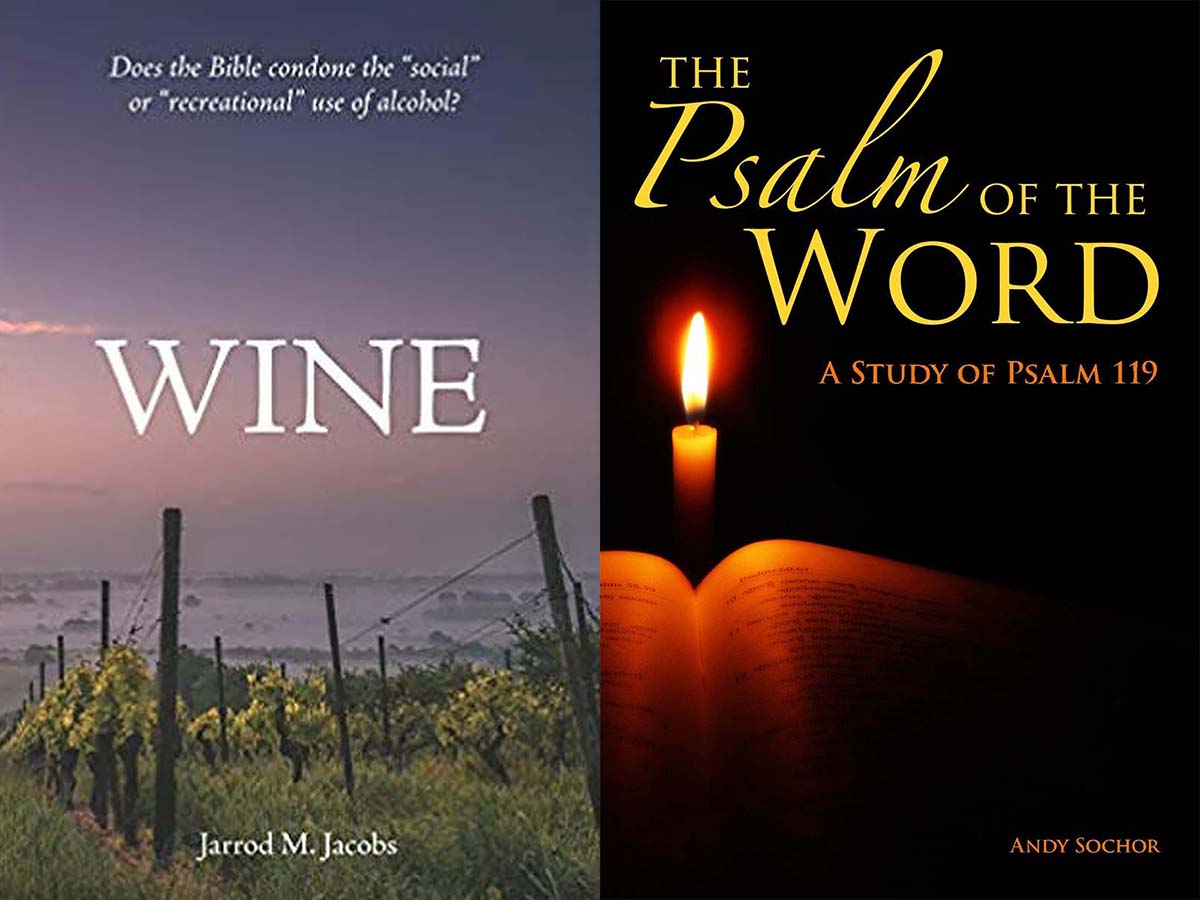by Chris Reeves
Synopsis: If you spend too much time focusing on short social media posts, and want to try something with a little more substance, Chris suggests two religious books that would be worthy of your consideration.
When was the last time you picked up a good, religious book, other than your Bible, and read it all the way through? During this age of brief social media posts like memes, tweets, and texts, we are increasingly conditioned for the short rather than the long. Yet, there is much informative reading in the longer book-style of communication. Let me recommend a couple of good ones that won’t take too long to read all the way through and will inform you greatly.
The first good book is by Jarrod Jacobs and is entitled Wine: Does the Bible Condone the “Social” or “Recreational” Use of Alcohol? Brother Jacobs has put together some excellent material that is biblically sound on the subject of drinking alcohol. It is more of a booklet of only fifty-nine pages. I read it through in just one sitting. Jacobs concludes that the Bible does not, in fact, condone social or recreational use of alcohol for anyone. He studies the term “wine” as it is used in the Bible and emphasizes that this word must be studied in its context. Sometimes it means alcoholic wine, and sometimes it does not. Not all “wine” in the Bible is alcoholic wine. Next, Jacobs points out the low alcohol content of most Bible wines and observes that what people are drinking today has a much higher content of alcohol. The high-alcohol content of wines and other intoxicating drinks today would be like the “strong drink” of the Bible, which is clearly condemned.
Jacobs also answers the question about fermentation in Bible times: Could ancient people store unfermented grape juice? The answer is, “Yes, they could and did.” People in Bible times did not have to drink fermented or alcoholic wine if they did not want to because they had unfermented wine available to them. Jacobs’ book includes the results of an experiment performed by Kyle Pope in 2010 in which Pope kept unfermented grape juice with a 0% alcoholic content stored for two years. Pope used the same techniques available to people in Bible times to show that it is possible. The Bible also discusses the drinking of alcohol and Jacobs covers seven of these passages of scripture (Prov. 20:1; 23:29-35; 31:4-5; 1 Cor. 6:9-11; Gal. 5:19-21; Eph. 5:18; and 1 Pet. 4:3-4). Jacobs concludes correctly that drinking alcohol (in both small and large amounts) is condemned in Scripture. Even with the biblical case against the drinking of alcoholic wine, some people, including brethren, try to use the Bible to justify the practice. Jacobs takes a chapter in his book to answer these arguments like “Jesus turned water into wine,” “Timothy was told to drink wine,” etc. He also answers other questions about wine in the Bible. Jacobs concludes that God doesn’t want us to drink alcohol in a social or recreational way. Our young people especially need to get the message to stay away from alcohol. Get this excellent book for yourself and others who may need to be informed on such a prevalent topic. Brother Jacobs’ fine books are available at https://truthbooks.com.
The second good book, entitled The Psalm of the Word: A Study of Psalm 119, is written by Andy Sochor. He examines the longest psalm in the biblical psalter, dividing it into sections, and explaining each in light of the overall theme of God’s word. This psalm, often attributed to King David, has twenty-two stanzas (or sections) with eight verses in each— matching the twenty-two letters in the Hebrew alphabet. The Psalm of the Word also has twenty-two chapters, one for each section. Even though all sections of this psalm focus on the word of God, each contains unique subject matter. Sochor brings this out. As Sochor moves through Psalm 119, he answers various questions about the word of God, such as “What is the word of God? How should I regard it in my heart? For whom is the word of God revealed? When should I apply it in my life? Where can the word of God help me each day? Why should I have such a great love for God’s word?”
As you work through each section of the psalm, Sochor comments on each verse, brings out many modern applications, and does an excellent job of outlining each section. Sochor’s skills at outlining and organizing each section are his strong points and something that you will not find in similar commentaries. There are many commentaries on the psalms, but The Psalm of the Word serves as a stand-alone commentary on Psalm 119. However, this book is not written for the scholar, but for everyone. Sochor does not dive into deep Hebrew word etymologies or scholarly theories about the psalm. He is very practical, bringing out the divine material in a way that helps the reader face each day with a proper obedience to God. He covers principles like purity, companionship, revival, affliction, persecution, guidance, riches, grace, help, truth, etc. Each reader, regardless of his place in life, will get something from this book to help his obedience to God. That is something greatly needed today. You will be strengthened when you read this book, and you will grow in your love of God’s word. You might even cry out like David did somewhere along the way: “Oh how I love thy law. . .” (Ps. 119:97).
One suggestion while reading this book would be to read a section a day for twenty-two days. You will have a much better understanding of God’s word in less than a month! You could use it like a daily devotional or even in a small group Bible study. I also recommend this book to preachers who can use it to develop a preaching series for the local church. Brother Sochor’s fine book can be found at https://truthbooks.com.


